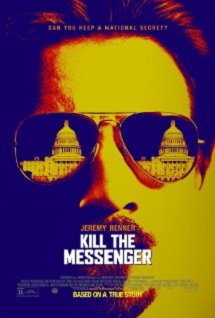 After breaking out with The Hurt Locker, Jeremy Renner took on a series of action roles that saw him join some big-ass franchises, including Mission: Impossible and The Avengers. Over the last couple years, though, he’s been going back to his character-actor roots in projects like The Immigrant, American Hustle, and a not-nearly-lauded-enough guest starring stint on Louie. Now, in Kill The Messenger, he is once again the leading man. I just wish the final effort was more worthy of his talent.
After breaking out with The Hurt Locker, Jeremy Renner took on a series of action roles that saw him join some big-ass franchises, including Mission: Impossible and The Avengers. Over the last couple years, though, he’s been going back to his character-actor roots in projects like The Immigrant, American Hustle, and a not-nearly-lauded-enough guest starring stint on Louie. Now, in Kill The Messenger, he is once again the leading man. I just wish the final effort was more worthy of his talent.
Kill The Messenger is based on the true story of Gary Webb, a journalist who broke the story about the CIA having some involvement with cocaine smuggling in the 1980’s during the Iran-Contra scandal. Webb’s series of articles, published in the San Jose Mercury News, was called “The Dark Alliance” and they were one of the first news stories to go viral—before that was even a thing—in the early days of the internet. But his story is a cautionary tale, for Webb, accused of fudging his facts, was left hung out to dry when virtually everyone in the journalism world, from his publisher to his editors to his peers, turned their backs on him. Reputation ruined, Webb eventually committed suicide in 2004.
It’s an outrageous, outraging story, and it’s clear why Renner would be drawn to it. It’s dramatic and compelling and timely, given our current culture of whistle-blowing. There’s a case to be made that what happened to Webb—so publicly denigrated after going up against the government—is part of the reason why these days, whistleblowers don’t go to journalists, they just dump everything on the web directly. Connections between how Webb was treated and how we view figures such as Julian Assange can be made as well.
Unfortunately, the movie never really asks us to think that much on Webb’s tragic legacy. Renner—who also produced the movie—portrays Webb as a bulldog-determined newspaperman, the unknowing last of a dying breed as computers invade the newsroom and his “Dark Alliance” articles rocket around the burgeoning internet. As a performance, it’s one of Renner’s best. But as the fulcrum for the narrative, the movie seesaws between being a character study and a procedural when it needs to be one or the other. Either the story is about Webb’s descent into suicidal depression after the ruination of his career, or it takes a step back and uses Webb as the lens through which we see the journalism industry at the beginning of the end, with this sacrificial lamb of a reporter caught on the precipice between hard-facts reporting a la Watergate and the more salacious, gossip-style news we get today from cable TV and digital outlets like Gawker.
Kill The Messenger tries to split the difference and suffers for it. The movie is sharpest when it’s following Webb as he investigates the tip that the CIA was involved with drug smuggling in the 1980’s. Some of the thriller elements are a little heavy-handed, amping up the drama when really, this story comes with a built-in outrage button and doesn’t need the extra juice. Less interesting is Webb’s home life—certainly it informs the character, but the story isn’t really about Gary Webb, Family Man. It’s about Gary Webb, Persecuted Journalist. Anything that isn’t working toward that feels like a distraction.
But as a vehicle for Renner, it succeeds. This is easily his sharpest, most engaging work since The Hurt Locker. Renner’s always had the ability to go from slow-burning intensity to explosive emotion seemingly in no time flat, and the film makes the most of his considerable range. The acting in Kill The Messenger can’t be faulted. I just wish the movie itself was as focused and driven as Renner’s performance.

